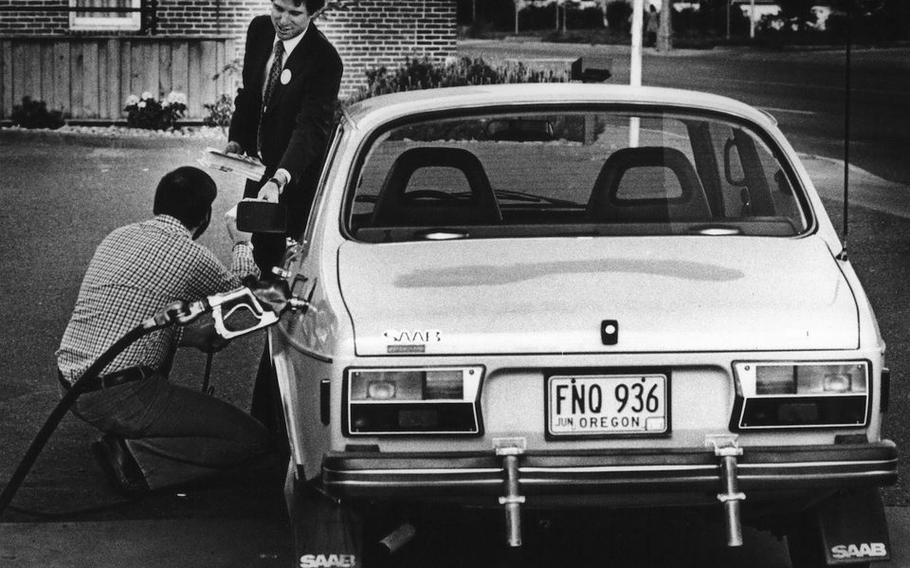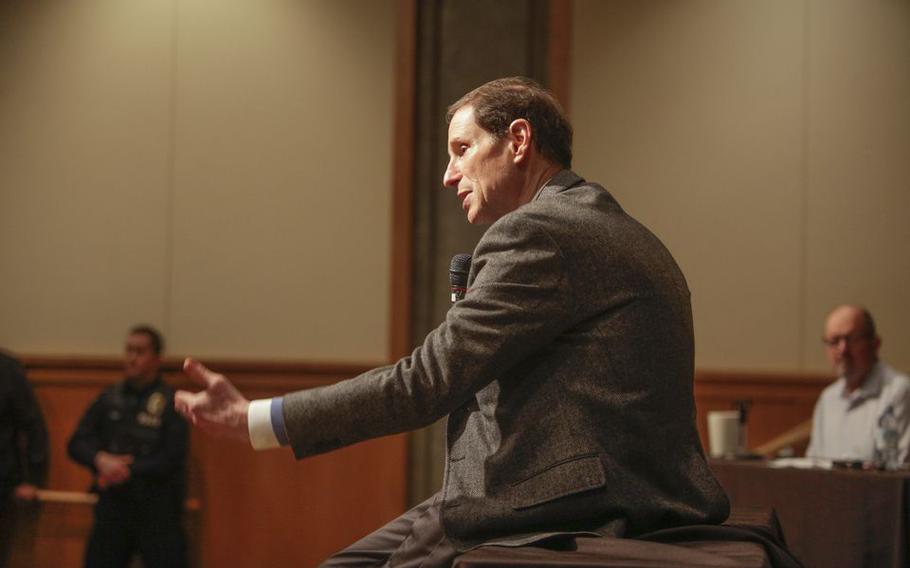
Ron Wyden seeks out voters in 1980. His father helped him with the successful campaign for a U.S. House seat. (The Oregonian/TNS)
(Tribune News Service) — Peter Wyden was always kind of vague when his son asked what he did during the war.
“He never used those words, like ‘spy,’ that would capture what he was up to,” says Ron Wyden, Oregon’s senior U.S. senator. “He’d say, ‘We dropped leaflets. We tried to convince [the Nazis] to surrender.’”
Young Ron saw no reason to press him on it. His father was a globe-trotting journalist who had plenty of other fascinating stories to tell. But then, years after Peter’s 1998 death, Ron came upon a photograph at the U.S. Holocaust Memorial Museum in Washington, D.C.
That black-and-white image shows U.S. Army Capt. Hans Habe surrounded by his men — including a pipe-smoking Peter Wyden, then still using the surname Weidenreich.
Sen. Wyden’s father, it turned out, had been deeply involved in American psychological-warfare operations during World War II. He was one of the “Psycho Boys,” or, as they were more often called, the “Ritchie Boys,” after Maryland’s Camp Ritchie, where many of them were trained.
A bipartisan group of U.S. senators, including Ron Wyden, heralded the Ritchie Boys in a Senate resolution last month. “Newly declassified reports,” they wrote, indicated that the unusual band of servicemen “were the source of nearly 60 percent of the credible intelligence gathered in Europe during World War II.”
These U.S. Army intelligence experts traveled with advancing Allied troops in Europe, gleaning information from townspeople, interrogating prisoners and undertaking various propaganda campaigns.
The Budapest-born Habe, a dashing officer and former wunderkind newspaperman in Vienna, had fought for the French Foreign Legion and escaped from a Nazi prisoner-of-war camp before making his way to the U.S. He knew he was well-suited to psychological-warfare work, describing himself as “without moral anchor, but good-natured; dangerously gifted [and] arrogant towards the world.”
He hand-picked many of the “Psycho Boys,” seeking out European-born intellectuals, such as German novelist Stefan Heym and the Czech journalist Joseph Wechsberg. He also chose the younger, less accomplished Peter Wyden, who had emigrated from Germany in 1937, at age 14, and launched his journalism career at the New York-based trade publication The Daily Metal Reporter.
Habe became Peter’s “new hero and, I suppose, father figure,” Peter wrote.
“His regal bearing suggested royalty,” Peter added. “His uniforms adhered to him like a London tailor’s fantasy. His numerous decorations included several we had never seen before. We hoped they were French.”
(This last bit was a joke, but a pointed one: Habe, like many of his recruits, was a refugee from a country under Nazi rule, and he spoke heavily accented English. Thus, to many of his fellow G.I.s, he and his men were suspect.)
When Habe was tasked in 1944 with turning the radio-broadcast facilities in newly liberated Luxembourg into a potent Allied propaganda tool, he selected Peter to join the mission.
The greatest weapon of Radio Luxembourg’s German section, Habe’s small team understood, would be actual facts. Their audience, under the Nazis, had rarely heard the truth about anything for years. Offering it now was how the operation would build credibility.
The broadcasters, acknowledging on-air that they were with the Allies, provided information about battles and read the names of captured German soldiers. They sometimes shared heart-wrenching personal letters written by German enlisted men, pulled from mail bundles that had been left behind by retreating Nazi units.
This was so-called “white” programming.
The propaganda team also created “black” programming — that is, disinformation — on different radio frequencies. Actors portrayed fictional disillusioned German officers offering reports that pretended to be, as one of the Ritchie Boys later put it, “warmly pro-German [and] sadly and desperately honest.” These reports included warnings about Hitler’s most-trusted men deceiving the Führer, and advice on how German soldiers and ordinary German citizens could save themselves as the enemy approached.
In the background, on occasion, listeners would hear English suddenly being spoken in barks, shots fired, tables overturned, as G.I.s apparently stormed the secret broadcasting room to knock these patriotic Germans off the air.
“Our job was to invite desertion — not normally evidence of one’s integrity,” Peter later wrote, “so we repainted treason as self-defense.”
German military leaders recognized the damage these broadcasts were doing. And so in December 1944, they launched a surprise operation, an offshoot of the Battle of the Bulge, that overturned transmission towers and pushed toward Luxembourg’s Old City.
The Allies ultimately held the city, but Nazi chaos agents remained in the area. Radio Luxembourg broadcasters now kept their helmets on and their guns at the ready as they took to the microphone.
“With few exceptions all my staff were refugees,” Habe pointed out. “The prospect of German captivity was not very tempting to any of us.”

Oregon Sen. Ron Wyden, shown here in 2015, didn't know much about his father's World War II service until recent years. (Stephanie Yao Long, The Oregonian/TNS)
Peter Wyden didn’t dine out on his wartime experiences. He didn’t tell his children stories of derring-do. Like most veterans of the war, he got on with his life.
Always “ebullient” and “the most interesting person in any room,” in his son Ron’s description, Peter launched a high-profile journalism career, working for Newsweek and the Saturday Evening Post. He won the Overseas Press Club Award for a book about the disastrous 1961 Bay of Pigs invasion.
But Peter was a Jew who’d spent much of his boyhood in Adolf Hitler’s Germany. He lost family and friends to the Holocaust. The war was never really over for him.
Which was why he decided to track down Stella Goldschlag, a former classmate at Berlin’s Jewish Goldschmidt School.
When he was 13, he’d been in love with the “leggy, cool” girl. He could still picture her walking to physical-education class, so important in Nazi Germany, in her “ruffled black gym shorts.”
Stella and her family did not make it out of the country as the Nazi crackdown on Jews accelerated.
Eight years after escaping Germany, Peter, now 21 years old, was back in Berlin, working as bureau chief for Munich-based Die Neue Zeitung, the centerpiece of the Allies’ postwar news-publishing enterprise in Europe.
With the war’s end, the victors launched dozens of newspapers throughout Germany — part of their denazification effort.
Hans Habe, who oversaw the effort, exulted when the massive printing presses in a “long, unaired room” in Munich rumbled to life and warm copies of the first-ever edition of Neue Zeitung trundled down the conveyer belt. For years these presses had been used exclusively for Volkischer Beobachter — the Nazi Party’s newspaper, the “Führer’s daily.”
“We were running the machines which had spewed out millions of lines of poisonous lies into a poisoned country,” Habe recalled with pride. “We were printing a million copies. And we were printing the truth.”
(Max Kraus, a World War II veteran who spent his postwar career in Europe with the U.S. Information Agency, insisted in an oral history that Neue Zeitung “played a key role in the establishment of democracy in West Germany.”)
While getting settled in his new position for Neue Zeitung in 1945, Peter learned that Stella Goldschlag had been arrested in Berlin’s Soviet sector. The charge: “aiding and abetting multiple murders.” It turned out she had been a “catcher” for the Nazi regime — that is, she hunted her fellow Jews in Germany’s underground, betraying hundreds of them to the Gestapo.
Recalling the teenaged girl whose beauty and charisma had dazzled him, Peter tried not to blame Stella, figuring she did what she had to do to survive. He fantasized about how it all could have been different if he’d managed an adolescent romance with her.
“What if we had become inseparable?” he found himself wondering. “What if I had set off a friendship between my parents and her parents at one of the Parents Nights of the Goldschmidt School, where I used to see all of the Goldschlag family?” Maybe his parents would have convinced hers to also flee before it was too late.
Peter didn’t try to find Stella in those alternately heady and dispiriting Berlin months after V-E Day. But four decades later, long after she’d been released from prison, he did — and he conducted several interviews with her.
His old fantasy did not hold up under scrutiny.
Listening to Stella spit out embittered lies and rationalizations “nauseated” his father, Ron Wyden says, adding that he and his dad talked at length about Stella. “He decided this was pure evil.”
But writing about what had happened to his teenaged crush — the book, “Stella: One Woman’s True Tale of Evil, Betrayal and Survival in Hitler’s Germany,” became a bestseller — didn’t allow Peter to move on.
Adolf Hitler, who took his own life in 1945 as Russian troops closed in on his Berlin bunker, is the most-notorious mass murderer in history, and yet he has remained a hero to some people. Peter couldn’t understand it — but he needed to understand it.
He began reporting on neo-Nazis and Holocaust deniers in Europe. This work would become his last book, “The Hitler Virus,” published after his death.
But while the trauma of his German childhood and World War II stayed with Peter Wyden, it didn’t consume him.
He loved being an American, and he did all the things Americans were expected to do: He worked too much, married three times, doted on his children.
When Ron, a University of Oregon law school grad and all of 30 years old, decided to run for Oregon’s 3rd District U.S. House seat in 1980, his father flew in from Connecticut to help with the campaign.
“He was very involved in the election,” Ron says — and that included Peter serving as “moderator” for half-hour policy discussions that aired on local TV as paid campaign advertisements.
All these years later, Sen. Ron Wyden thinks about his long career in Congress, the privileged life he’s led, and he credits his father. It’s one of the reasons he embraced the Senate resolution for the Ritchie Boys.
“It’s been an incredible experience representing Oregon,” he says. “What my dad and the soldiers he helped did during the war made it possible.”
©2021 Advance Local Media LLC.
Visit oregonlive.com.
Distributed by Tribune Content Agency, LLC.